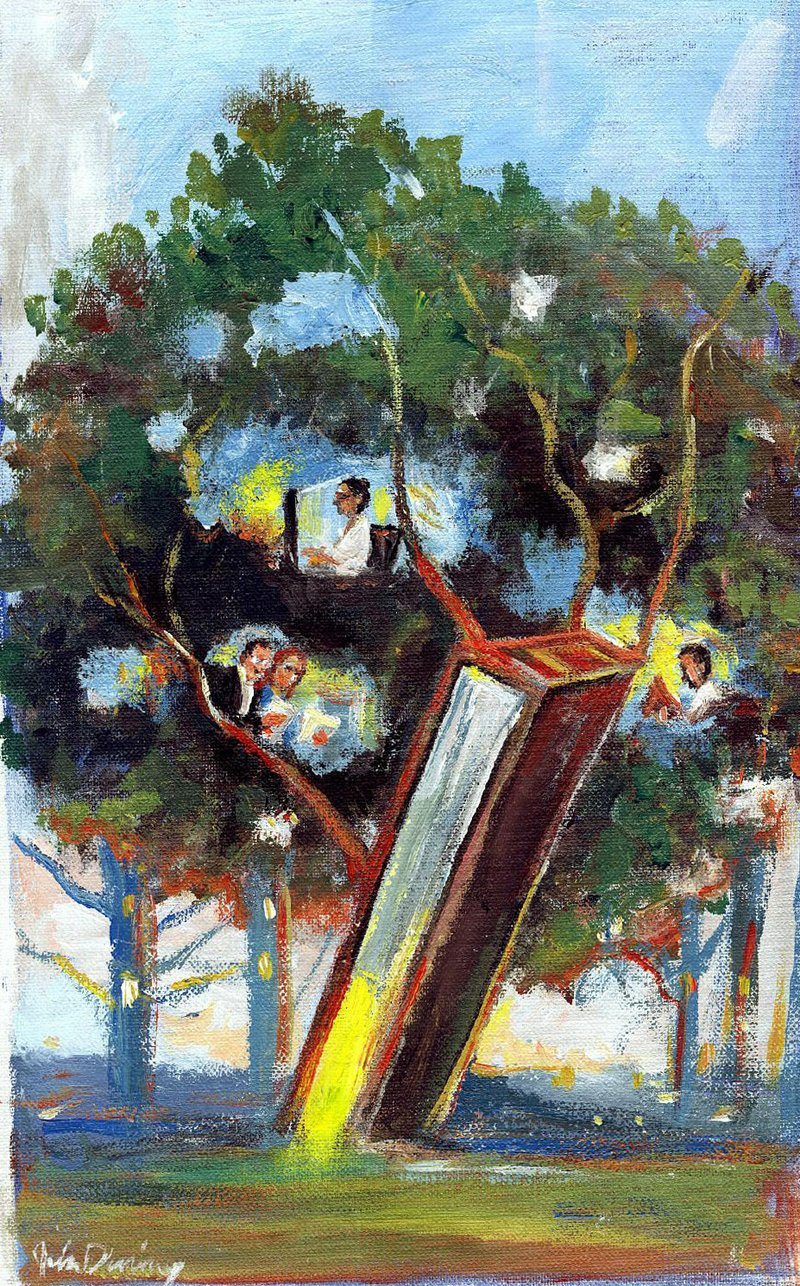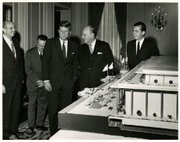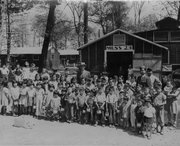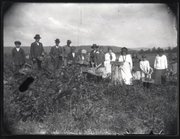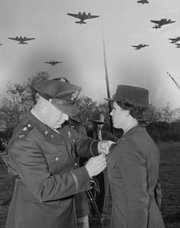Southerners are a storytelling people.
The past is personal; time is often measured in generations rather than years or decades. In Arkansas, ensuring that the past is not forgotten -- along with its stories and wisdom -- is a full-time job that falls to five major and a half dozen smaller archives.
The Arkansas General Assembly established the state's first official archive in 1909 with the creation of the Arkansas History Commission. Recently renamed the Arkansas State Archives, its mandate is to collect records from state government agencies as well as items of historical importance from around the state.
The archives moved from the Department of Parks and Tourism to the Department of Arkansas Heritage on July 1 in an effort to raise its visibility to the public, archives director Lisa Speer says. Speer says she oversees 25 full-time employees and a $1.2 million budget, most going to salaries. The archives at 1 Capitol Mall in Little Rock hold some 14,000 cubic feet of records, and the system also has a branch in northeast Arkansas in Lawrence County and a branch in southwest Arkansas in Hempstead County.
Several other major archives across the state together store millions of letters, political papers, photographs, videos, audiotapes and historical artifacts. These primary materials form the backbone for researchers, students and authors to write books and articles.
In Fayetteville, there's the Special Collections Department at the University of Arkansas. In Little Rock, the University of Arkansas at Little Rock Center for Arkansas History and Culture at the Arkansas Studies Institute, the Butler Center for Arkansas Studies and the Clinton Presidential Center archives are all important resources for members of the public who are interested in the state's past.
Far from a passive, musty idyll, the steady collection of materials about
Arkansas' past allows its people to "build a better future for the state," says David Stricklin, head of the Butler Center.
One cannot address a problem, Stricklin argues, without understanding how the problem came to be. He is particularly proud of the center's extensive genealogical collections from all 75 Arkansas counties. Through assorted official records, they enable some black Arkansans to trace their heritage prior to the Civil War, he says.
"When I started in the history business, there was an impression that, with African-Americans, you could only go back to the Civil War, because of slavery and lack of a way to track African-Americans before emancipation," he says. "There was this wall. Well, my colleagues in the Butler Center just demolished that wall."
Donating to an archive is as simple as calling and offering historical records such as letters, and photos of business and social groups. Some, however, specialize in certain subjects.
...
The state archives in Little Rock and the University of Arkansas at Fayetteville's Special Collections possess extensive Civil War collections, as well as collections from World War I and World War II. The Arkansas State University Archives and Special Collections in Jonesboro do not accept Civil War records, while the archives at the University of Central Arkansas in Conway do. Ouachita Baptist University in Arkadelphia also operates a small, but significant university archive.
The Clinton Presidential Center archives hold some 78 million pages of official records, 20 million emails, two million photographs and 12,500 videos about the life of the nation's 42nd president.
Politicians are not required to give to the state archives, so the documents from their tenures can be found scattered at various archives across the state. UALR's Center for Arkansas History and Culture holds the collections of five former governors: Carl Bailey, Winthrop Rockefeller, Dale Bumpers, Frank White and Jim Guy Tucker.
The Butler Center, in the River Market District, connects visitors to collections of 126 U.S. senators and representatives, including several Confederate congressmen. Otherwise, the Butler Center primarily holds papers of private businesses, people and organizations.
Another point of pride for Stricklin is the collections of Arkansas women's organizations from the late 19th and early 20th centuries. With women banned from voting or earning property, the papers reveal the beginnings of a nascent women's suffrage movement, Stricklin says.
Up in Jonesboro, ASU archives Director Brady Banta oversees an operation that documents the history of northeast Arkansas since 1880.
Until that time hardly anybody lived in the area, which was then a marshy, hardwood swampland. When furniture manufacturing companies in Michigan, Wisconsin and Ohio ran out of native pulp, they formed investment syndicates and bought up land in Arkansas. Rather than moving their manufacturing operations to the state, as companies might now, the manufacturers set up lumber camps and imported thousands of workers, clear-cutting the virgin timber before shipping it north.
When the forests were gone, agriculture replaced the lumber companies as a source of employment, with cotton and then rice as cash crops. Finally, evolving agricultural technology put thousands of people out of work and prompted a massive outflow from the region.
"In many areas [there was] almost a total transformation of the environment," Banta says. "It looks nothing like it did 150 years ago. And you don't have evidence of the thousands and thousands of people that lived out in the countryside and the rural areas. The houses are gone, in some instances even the roads are gone. So it's kind of an ongoing process that is one of our focal points in the types of materials that we collect."
ASU's archives include photos, business ledgers, letters and more that document the transformation.
The UCA archives feature collections of prominent Arkansas media personalities, former Arkansas Gov. Ben Laney, who served from 1945 to '49, and local women's social organizations, many of which have folded in recent years as younger women joined the workforce.
"I have been the last speaker for two women's organizations," UCA Archives Director Jimmy Bryant says. "I gave a 20-minute or so speech, they thanked me for coming, told me I was their last speaker and gave me their papers."
...
Not everything about archival work need be backward-looking, experts say. Sometimes past solutions can be applied to current problems.
Between the stock market crash of 1929 and the United States' entry into World War II, the number of major buildings at UCA (then known as Arkansas State Teachers College) grew from five to 15, Bryant says. The archives has a collection detailing the building process.
"A lot of building went on here at UCA during the worst economic time in history, and the reason we can talk about it intelligently is because we have the archives," Bryant says. "You can see how they dealt with economic problems. There were three different wage cuts at that time. Instead of laying off certain people, they cut everybody back several times."
Most buildings were made possible by $30,000 direct grants and 75 percent loans through the federal Public Works Administration, Bryant says.
One aspect of the program he believes could help the economy today was a requirement that building materials be manufactured domestically, unless a competing material cost 25 percent less, in which case a waiver could be applied for.
"I thought that was a good idea," Bryant says. "Not only are you [creating] jobs for people on the project, but you're also buying materials from many people here in the United States."
A major issue for archivists today is digitizing records as well as accepting electronic records. The state archives in Little Rock now uses software called Preservica to collect electronic records from government agencies and departments, director Lisa Speer says, such as budgets and meeting minutes.
The University of Arkansas has digitized collections including audio files of traditional Ozark folk songs and records of the Civil Rights era in the state, which the public can access at digitalcollections.uark.edu.
At ASU in Jonesboro, Banta says the archives' limited staffing and resources have prevented an effort to digitize records that might allow the public to access them online. The Butler Center provides access to portions of its collections online, including a fantastic multimedia archive of Arkansas Korean War veterans.
Whether in the digital sphere or on paper, one theme archivists repeat is that there is a common goal among each of the archives, even if their areas of expertise overlap.
"We don't have any rivals, we only have allies," the Butler Center's Stricklin says. "Our only foe is ignorance. And anybody who's against ignorance is our ally."
Style on 07/10/2016
